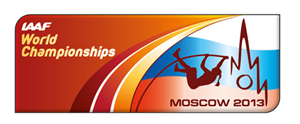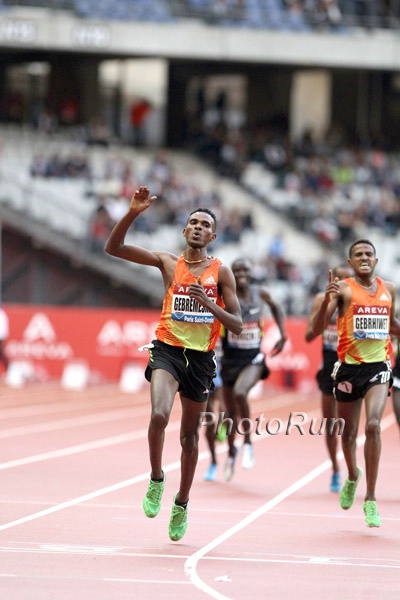Men’s 10,000 Preview: Can Anyone Possibly Beat Mo Farah?
by LetsRun.com
August 3, 2013
The first track final of the 2013 IAAF Moscow World Championships takes place in one week on day 1, Saturday August 10th, and it’s a big one as it features the faces of distance running in the Western world- Mo Farah and Galen Rupp – the two Alberto Salazar-coached athletes who won gold and silver last year in London.
Farah, The Heavy, Heavy Favorite
Mo Farah comes in as the double Olympic champion and heavy, heavy favorite.
Yes, he lost the 5,000 at the Prefontaine Classic on June 1st after a bout with illness, but since then he’s looked incredible and showed speed never seen before by a distance runner.
On June 22nd, he closed a tactical 5,000 in 50.89 to win the European team championships – that’s an unofficial world record for fastest last lap in a 5,000. On July 19th in Monaco, he set a European record in the 1,500 by running 3:28.81. In between, he beat Ethiopia’s top 5,000-meter man on the year – Yenew Alamirew – by closing in 25.8 in Birmingham (last lap 53.4, last 800 1:51.0).
With that type of speed, how do you possibly beat Farah? Well, Italian coach Renato Canova has essentially said you don’t. “Wait he will become old,” said Canova on Alberto Stretti’s blog. A message board discussion on how to beat Farah can be found here: MB: RENATO CANOVA: “HOW TO BEAT MO FARAH? TO WAIT HE WILL BECOME OLD”
So the race is basically over, everyone should just raise the white flag and we should debate who is going to get second, right?
Not necessarily.
What if we told you there is a guy in the race who last year ran the fastest 5,000 in 8 years at 12:46.81 (meaning his 5,000 PR is nearly 6.3 seconds faster than Farah’s 12:53.11), closed the Olympic 5,000, Farah’s best event, as fast if not faster than Farah (but was caught in traffic and settled for silver) and made his 10,000 debut earlier this year with a world-leading 26:51.02?
All of that is true and the competitor’s name is Dejen Gebremeskel.
Gebremeskel, 23-year-old from Ethiopia, is the real deal and is the one guy we can logically make the case as having a legitimate shot of beating Farah.
Gebremeskel has been laying low recently. After a win at the Carlsbad and BAA 5ks in April, he put up a real clunker in his first track race of 2013, as he only ran 13:31.02 at the adidas Grand Prix. That was was in May. No one is writing Farah off for losing Prefontaine on June 1st, so why should Gebremeskel be written off for one bad showing in May?
He shouldn’t. Since then he ran the 26:51 at the end of June and has been training exclusively for the Worlds 10,000.
If we were looking for chinks in Farah’s armor, and we’ve got to look hard for any chinks, we’d say we don’t know how strong he is. Has he sacrificed some endurance to get such great speed? After all, his fastest time on the year is only 13:05 and he hasn’t run a 10,000 all year.
To be truthful, we imagine Farah is plenty fit and strong, as he was running 60:59 for the half marathon back in February. We are just trying to make the case the race may not be as clear-cut as you might think.
Who else has a shot? Our Top Three (OK, it’s really 5) Contenders For Bronze (or a huge, huge upset for gold)
1. Galen Rupp – USA
The Olympic silver medallist Galen Rupp clearly can’t be overlooked. Last year, thanks to Rupp, we witnessed something extremely rare – a white guy winning a medal in the 10,000 (if you don’t think genetics might play a big role in sports, please read David Epstein’s new book, Sports Gene).
Rupp comes into Worlds after a 3:52 mile in London. That’s the good news. The bad news is his previous race before that was just a sixth-place showing in the Monaco 5,000 in 13:05. And prior to that, every race Rupp had run so far this year outdoors had been worse than his corresponding race the year before.
|
Comparing Galen Rupp 2012 Versus 2013 |
|||
| Race | 2012 | 2013 | Verdict: |
| 1,500 at Oxy | 3:34.75 (2nd) | 3:36.98 (2nd) | 2012 better |
| 5,000 at Pre | 12:58.90 (3rd) | 13:08.69 (6th) | 2012 better |
| 10,000 at USAs | 27:25 (won by 8+sec) | 28:47 (won by 2+sec) | 2012 better |
| 5,000 at USAs | 13:22 (1st) | 14:54 (2nd) | 2012 better |
We certainly don’t think Rupp is challenging Farah or Gebremeskel for gold, but he’s got a good shot at bronze.
2) Bedan Karoki – Kenya
A Kenyan man hasn’t won the 10,000 at Worlds since 2001 (and hasn’t won the Olympics since 1968). The one guy who has any shot of reversing that is Bidan Karoki. Last year at the Olympics, he was the top Kenyan finisher in fifth.
The 22-year-old won the Kenyan Trials by 1.15 seconds and is Japanese based.Don’t think that’s not significant. At the last Worlds in 2009, there was a surprise winner in the 10,000 – Ethiopia’s Ibrahim Jeilan. And what does he have in common with Karoki? He too was Japanese based and coached (it’s worth noting that the second placer at the Kenyan Trials, Paul Tanui, is also Japanese based).
3) The Three Other Ethiopians – Abera Kuma, Imane Merga And Ibrahim Jeilan
The three other Ethiopians all have a shot at a medal. The runner-up to Gebremeskel in the unofficial Ethiopian Trials race in Solletuna was 22-year-old Abera Kuma, who ran 26:52.85 (1.83 behind Gebremeskel). He also has a 13:00.19 PR for 5,000 and 60:19 for 13.1. Imane Merga, the 2011 World Cross-Country champion, was third in Sollentuna but second in the Pre 10,000 and is much more experienced on the big stage and won a bronze at the last Worlds in the 10,000 in Daegu. He very well could add a second bronze here.
And let’s not forget the defending champion. Ibrahim Jeylan stunned the world by winning in 2011. Last year, he was out with an injury but is on the comeback trail this year. The results haven’t been great, as in his last race on June 30th, he was beaten by Farah by more than five seconds in the Birmingham 5,000. But going into Worlds in 2011, Jeylan’s seasonal best was 13:09 for 5,000. This year, it’s once again 13:09.
It’s good to have such a big talent back in the game as Jeylan is still only 24.
Two Other Americans
The two other Americans in the race enter at opposite ends of their careers. This very well could be the last time you see Dathan Ritzenhien (Ritz), the runner-up at the US Trials, on the track in a USA uniform.
The 30-year-old Ritz was 14th in the Olympic final last year, but has seen better results since then and has been having a bit of a resurgence on the track this year. After the Olympics last year, he ran a big PR in the marathon in Chicago (2:07:47) and then at Prefontaine earlier this year, he broke 13:10 for just the second time in his career (hard to believe given his 5,000 PR is 12:56.27). However, he struggled a bit at the end of the 3,000 in London last week.
22-year-old Chris Derrick, who has been flourishing so far in his first year as pro, will compete on the sport’s biggest stage on the track for the first time in Moscow. Earlier this year, he won USAs in cross-country and was 10th at Worlds before breaking 13:10 for the first time in his career at Prefontaine (13:09.04) and then finished third at USAs in the 10,000 (hasn’t raced since).
Quick Take #1: It’s worth pausing a moment and appreciating one man who isn’t competing at a global 10,000 for the first time since he made his 10,000 debut in 2003, Kenenisa Bekele. The world record holder at 26:17.53 had an incredible 10,000 career as he won 4 world and 2 Olympic titles at 10,000.
It’s a shame in our minds that he’s not competing here, but bizarre, non-athlete friendly decisions by Athletic federations seem to be common whether it’s in the US, Ethiopia or Kenya. Bekele – arguably the greatest 10,000-meter man in history – isn’t at Worlds even though he is undefeated at 10,000 this year and won the Prefontaine 10,000, which included both Kuma and Merga and originally was going to serve as the official Ethiopian 10,000 Trials.
Go figure.
Quick Take #2: Two-time World XC medallist Teklemariam Medhin of Eritrea, a guy we fell in love with in Poland earlier this year as he medalled after sleeping in the airport for two days, is running the 10,000 as well. His compatriot, the half-marathon world record holder Zersenay Tadese isn’t. We don’t expect Medhin to medal though as only he ran 13:32 in Lausanne on July 4th.
Quick Take #3: Want our predictions? We’ll make them closer to the event once the start lists come out.
Quick Take #4 (Added 8/4): It’s important to make sure everyone realizes it’s not normally hot in Moscow in August. The normal high for August 10th (race-day) is 71.6 Fahrenheit (22 Celsius) so conditions are normally pretty good for distance running.
The early forecast for next Saturday, however, is for it to be much hotter than that. Accuweather is predicting a high of 84 degrees Fahrenheit (29 Celsius) next Sunday while weather.com is predicting a high of 78 (25.5). That could change as it’s supposed to be much cooler the next day. But if the hottest forecast comes true, the worse case scenario is at race time it’s in the high 70s.
More From The LRC Vault: *2013: Meet Eritrea’s Teklemariam Medhin – LetsRun.com’s Athlete Of The Week
*2012 Olympic Men’s 10,000: Mo Farah Gets It Done In Front Of The Home Crowd As Galen Rupp Gets Historic Silver*2012 Men’s Olympic 10,000 Preview: Can Kenenisa Bekele Upset Hometown Favorite Mo Farah And Win An Unprecedented Third 10,000 Title?
*2011: Unheralded Ethiopian Jeilan Nips Mo Farah In Thrilling 10,000m Final





